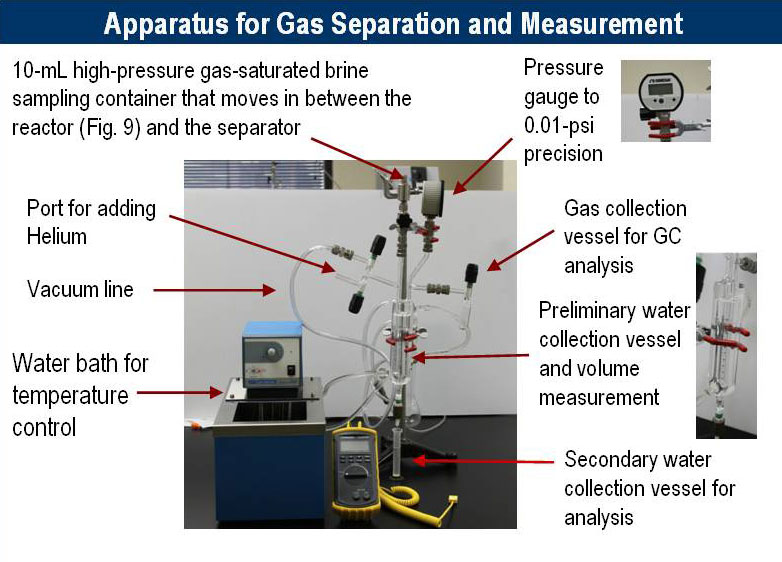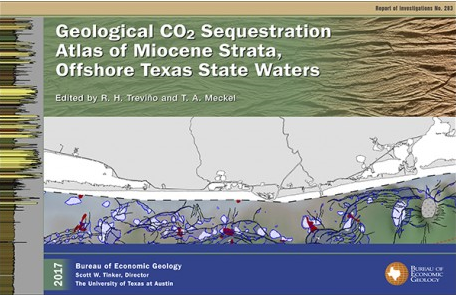Center for Frontiers of Subsurface Energy Security (CFSES)

Program Overview
Between 2009 and 2018, goals for the Center for Frontiers of Subsurface Energy Security (CFSES) were to develop a scientific understanding of subsurface physical, chemical and biological processes across varying scales in order to predict the behavior of CO2 and other byproducts of energy production that are stored in the subsurface.
CFSES was funded by DOE Basic Energy Sciences and was a cooperative of The University of Texas' Petroleum Engineering Department, Jackson School of Geosciences, the Bureau of Economic Geology’s Gulf Coast Carbon Center (GCCC), and Sandia National Laboratories.
CFSES Phase I (2009–2015)
The first phase developed from a $15.5 million award where the GCCC’s Researchers were brought in to complete several items under 2 specific tasks:

Click diagram to view larger.
For Task I, Research Scientist Katherine Romanak collaborated with other scientists from Sandia National Laboratories and UT's Department of Geological Sciences. Notably, the Bureau of Economic Geology’s Katherine Romanak and Tongwei Zhang built, and tested, an apparatus for separating fluids collected from the supercritical reactor (see figure at right). This apparatus separated dissolved gases from brine at ambient pressure and temperature for dissolved gas solubility measurements. Lab experiments on the high PT apparatus were coupled with pore-scale modeling, molecular modeling, microbial studies, and imaging the behavior of supercritical CO2.
For Task IV, the GCCC’s PI Susan Hovorka, Ian Duncan, and GCCC staff provided case studies, which were used to develop code optimized for multiscale, multiphysics processes. SECARB Stacked Storage at Cranfield is one of the few locations where dense data had historically been acquired to support code development. Data compilation and clean up were performed to create a model input file, including the time-lapse data needed to constrain the model in terms of lateral extent and variability in saturation.
CFSES Phase II (2014–2018)
In October 2014, UT Austin received a $12 million grant from the U.S. Department of Energy for carbon storage research aimed at reducing greenhouse gas emissions. This four-year grant was planned as an extension of a CCS research project at the CFSES led by Larry Lake at the Center for Petroleum and Geosystems Engineering (CPGE).
This CFSES project brought together approximately 20 faculty and researchers from across UT, including a number of GCCC researchers who played key roles. Former GCCC Sponsor Liaison, Hilary Olson, was the Assistant Director of CFSES. Research Scientist Tip Meckel was the UT Lead for a theme entitled, Buoyancy-Driven Multiphase Flow. Susan Hovorka and Tip Meckel both conducted research on mesoscale modeling and invasion-percolation modeling. Former GCCC Research Scientist, Changbing Yang, conducted geochemistry at the fluid-fluid interface. At the time, CFSES also involved active collaboration with researchers at Sandia National Laboratories.
This CFSES research program was designed to address challenges critical to developing CCS technology at a scale required to mitigate emission of greenhouse gases. These challenges included sustaining large carbon dioxide storage rates, on the order of gigatons a year, for decades, without compromising subsurface resources or storage security; using storage volumes with unprecedented efficiency, increasing from current estimates of 5 to 50%; and controlling undesired or unexpected emergent behavior in the geostorage system.
Check out a CFSES flyer from when this program was operating here.
Last Updated: May 1, 2025



